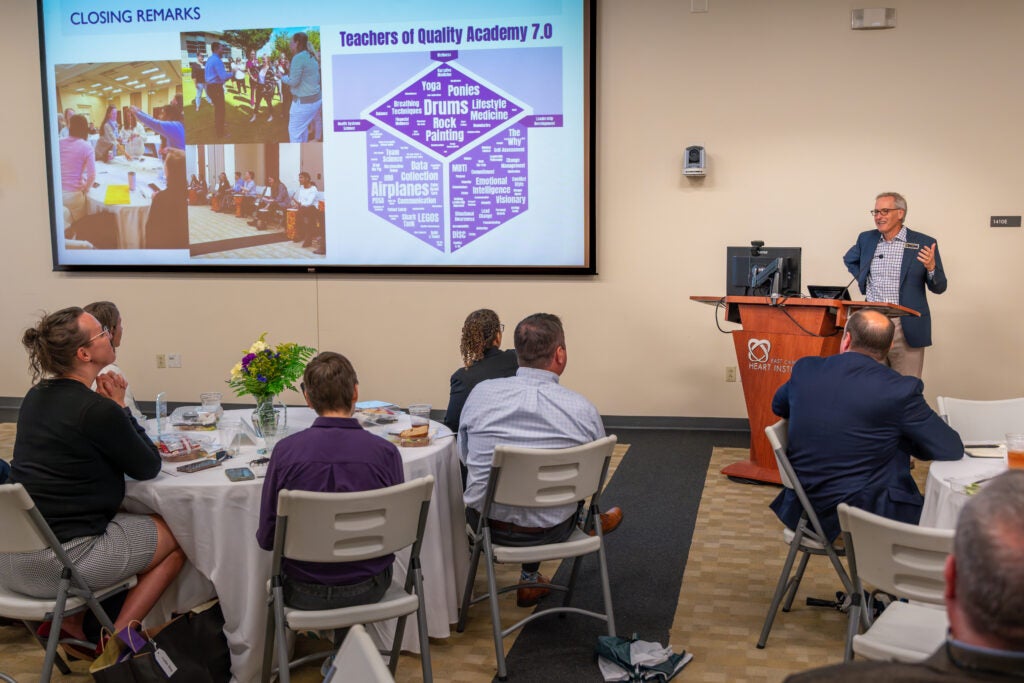Teachers of Quality Academy 7.0
On September 14, 2023, the Teachers of Quality Academy (TQA) program welcomed their seventh cohort of 37 scholars from ECU Health Physicians, ECU Health Medical Center, ECU Health North, ECU Health Chowan, and Contentnea Health. Additionally, the cohort includes participants from ECU’s Rural Family Medicine Residency Program, ECU Health’s Administrative Fellowship Program, and the MedServ Fellowship Program. TQA is led by Dr. Jennifer Sutter, Department of Pediatrics, and is jointly sponsored by ECU Health with Vice President of Quality, Lou Reida, serving as the executive sponsor for the program, and Jenna Garris, Office of Medical Education, serving as the administrative director responsible for program operation and administration.
TQA began in 2014, as a professional development program designed to provide health professions clinicians and educators with the skills necessary to practice, model and teach the new competencies of Health Systems Science (HSS): patient safety, quality improvement, systems thinking, population health and team-based care.
Participants in TQA are competitively selected based on individual applications and their potential to become change agents in the HSS competencies. TQA provides advanced training toward achieving a greater capacity to design and implement quality improvement activities and to apply these skills across the health system. Additional training in leadership of self, others, and leading change are included so participants can continue to advance the culture change needed to transform the delivery system.
The seventh iteration of the program is comprised of 12 half-day sessions alternating concepts of HSS and leadership development. A longitudinal wellness thread is woven into each learning session where participants engage in supplemental activities to further enhance the experience of life while at work. The TQA curriculum is delivered in an authentic setting using an experiential design. By designing experiences that span the continuum of professional development in clinical microsystems, participants are be better prepared to meet real-world challenges.
“I am excited to welcome this new cohort of TQA scholars as they begin their journey through the program.” Sutter said. “As leaders at ECU Health and in the community, our TQA 7.0 scholars serve as change agents in their clinical areas. The skills learned and the insight gained through this experience will help them build and lead more resilient teams and further promote a culture of change across the health system.”
| Participants | Quality Improvement Project |
|---|---|
| Mireille Liboiron & Caitlin King | By March 2024, decrease vent days by 10% for patients with respiratory failure in the PICU. |
| Elaine Cudnik & Kathryn Jarvis | By June 2024, decrease PICU transfers that transfer back with in 24 hours by 25% |
| Jessica Scheller, Katherine Taylor & Rob Zerniak | In 12 months, have 60% documentation rate of the golden hour flowsheet for all babies <33 weeks born at all ECU Health hospitals |
| Stephanny Acevedo-Martinez, Michael Clay & Sunny Kainth | Implement a debriefing tool to identify resources for team members after an ESI-1 event. |
| Matthew Rapp, Courtnay Hale & Madison Stevens | By July 1, 2024, 75% of the inpatient charts with a primary or secondary diagnosis of Congestive Heart Failure that are audited will be compliant with obtaining and documenting daily weights, intake and output, and communication with the attending physician. |
| Kirk Philpot, Kelly Philpot, & Amanda Hargrove | By the end of this project (9 months), 50% of discharge summaries from the ECU Health Medical Center will contain physician recommendations for discharge in the discharge summary, and in turn this will improve the overall continuity of care post in-patient stay through better communication which will improve patient satisfaction and provider experience and possibly improve re-admission rates. |
| Chris Cummings & Missy Barrow | By the end of this project (9 months), 50% of discharge summaries from the ECU Health Medical Center will contain physician recommendations for discharge in the discharge summary, and in turn this will improve the overall continuity of care post in-patient stay through better communication which will improve patient satisfaction and provider experience and possibly improve re-admission rates. |
| Brook Hunter & Kimberly Biichle | For each clinic site, by May 2024, increase the percentage of patients age 40-75 with diabetes on appropriate statin therapy by 5%. |
| Muna Mian, Susan Eubanks & Emma Roberts | By September 2024, increase HCC coding in the General Internal Medicine clinic by 10%. |
| Holly Warren & Lisa Daniels | Aim needs to be finalized. |
| Jacob Pierce & Michelle Ball | Obtain a 5% decrease in surgical site infections for knee/hip surgery by July 1. |
| Shona Varghese, Sneha Vellala & Margaret Clifton | Decrease 10% of readmissions for advanced heart failure patients within 3 months of intervention. |
| Constantin Marcu & Susan Sandlin | Decrease 50% need for IV beta blocks within 6 months for patients obtaining special coronary CT. |
| Bryan Gerber & Heidi Carrow | Decrease in skin breakdowns by 25 percent over a year by evaluating different skin barriers + cannula securement devices. |
| Owais Bhatti, Iskra Myers & Dylan Henry | Reduce the number of parents not receiving an accurate dose of CRRT by 5% within 90 days by identfying the barriers to delivering the acceptable dose of CRRT in the MICU. |













